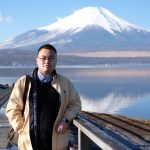Huan Xu / 早稲田大学ビジネススクール
 [Profile]International MBA, Class of 2019. Zemi leader of Maki Zemi (1st batch). TA of Technology and Operations Management (2019 Fall).
[Profile]International MBA, Class of 2019. Zemi leader of Maki Zemi (1st batch). TA of Technology and Operations Management (2019 Fall).Maki Zemi is one of the newest and probably most “bizarre” Zemi you can find in Waseda Business School (hereafter called WBS). Sure, we read cases and present cases as most Zemis do, but the key difference is that the cases we read are more academic than business, more quantitative than qualitative. It’s not surprising to witness the drastic change in student number on the 2nd session of Science, Technology, and Entrepreneurship (hereafter called STE) — 4 people remained in the class, down from 20 plus students who came to test flight the class one week ago. Nobody wants to learn about academics, and nobody wants to learn about empirical research here at WBS, that’s what one could conclude from this, at least in the first year.
Well look what happened in the second year, 1st semester of AY2019, our international Zemi has increased from 4 students to 11 students, while rumors say that people who want to join the evening Zemi have reached a shocking 40 students. What happened here? All of a sudden people WANT to study dulling quantitative papers and stressful empirical research again?
I think this drastic change resulted from one word, quality. The quality of teaching and practice in our Zemi have proven to be valuable by those who wanted to learn about cutting-edge knowledge in the business world (especially in the ever-evolving innovation and entrepreneur world). Maki Zemi has provided such an interactive learning platform by doing the following.
Empirical research, reasoning with numbers
Business professionals nowadays, when portrayed on television and the internet, they looked smart and could deliver their business vision, proposals, and recommendations from sheer wit. However, in practice, business professionals are not so different from people who work in labs, they need to analyze their business problems with concrete facts, often massive data from their daily operations, market surveys, analyst reports and so on. Sure, it takes guts and luck to make the calls, but what options could be there for one to make the call without the reasoning with numbers? How do you gain those skills when you’re studying in a business school? Practice. Our Zemi has provided many cases for us to develop our analytical skills, let alone the cases in STE course. Through those articles, we learned about how Silicon Valley came to be from one just single company dramatically chose to establish there, how knowledge flow helped shaping of the biotech ecosystem in San Diego, and one interesting foundation theory to explain those social phenomena— “non-linear random process”. These lay the foundations for a better judgment and management for future leaders in the business world.
Brilliant people
This Zemi has brilliant people with diverse nationality and backgrounds. Our members consist of a chemist, government officials, an SCM expert, a language trainer, an international trader, a research scholar on arts, a journalist etc. Each member has a unique perspective on business issues and can bring about the most unexpected insights sometimes. The synergy of industries is perfectly presented by the personal experience and networks of those individuals. How can environmental protection benefit the chemical industry? How can operations management affect the efficiency of education? How a well-connected network in journalist business can serve as a media to mingle people from different industries to do great business together? You’ll find here more often than anywhere else in WBS.
Collaboration, reaching out
If only dwelling in our own world of numbers, our Zemi wouldn’t be that interesting to attract many newcomers. Another brilliant aspect of our Zemi is the way it is connected with the business world and other Zemis. For instance, we have a good relationship with Asaba Zemi and went on a Zemi trip together to Nakatsukawa, Gifu in March 2018. We also had a joint Zemi together this year teaching students about 3D printing and drones, which has attracted many students who were on holiday to participate. We are also planning to visit the hardware Silicon Valley together in March 2019. Moreover, Maki Zemi also has a strong connection with industrial leaders like venture capitalists in Tokyo and Silicon Valley, CEO of Baidu Japan and scholars from other prestige universities who are in the front line of business research. From those collaborations and connections, not only have we enriched our experience and broadened our views but also established our personal network and those will surely benefit us in the future.
As an insider, my view of Maki Zemi may be biased, but we always welcome anyone who is interested in our Zemi to join us for discussions of interesting topics. The openness of the Zemi is just another reason why this Zemi is unique and has become more popular within just one year, in my opinion. As one of the founding members of this Zemi, I couldn’t be prouder.
次回の更新は12月21日(金)に行います。次回は早稲田大学ビジネススクールのDaye Chunさんです。